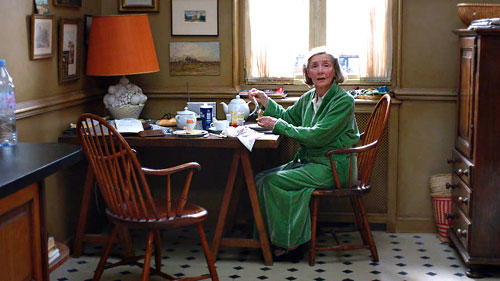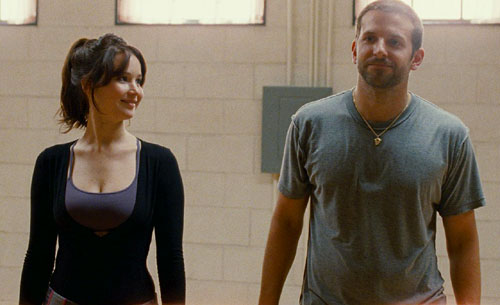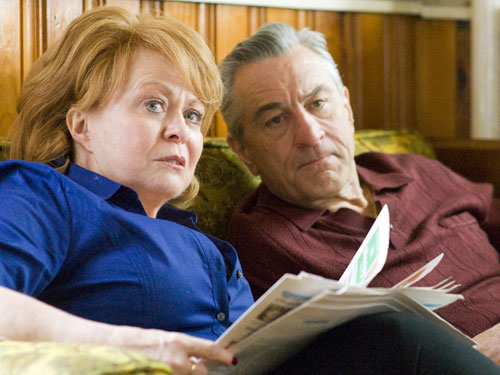|
Movies featuring elderly characters—movies as diverse as You Can't Take it With You, On Golden Pond, Harold and Maude, Driving Miss Daisy and Grumpy Old Men—tend to be at least slightly rose-tinted, the better to reassure audiences that, as Browning asserted, "The best is yet to be." A few films, such as Iris and Away from Her, have been more direct and forceful in their depiction of old-age decline. None, however, has been as unsparing as Michael Haneke's Amour.
Haneke's screenplay is ferocious in its simplicity. Anne (Emmanuelle Riva) and Georges (Jean-Louis Trintignant) are a couple in their eighties, both retired, top-level piano teachers. The film's opening scene, which gives away the ending, will not be discussed here. The second scene shows an audience gathering in a Paris concert hall to hear a solo recital by the distinguished pianist Alexandre Tharaud (playing himself). Although Haneke does nothing to differentiate Georges and Anne from the other concertgoers, they stand out almost in bas-relief. Alexandre is a former student of Anne's, and after the concert Anne and Georges greet him backstage. They then return home, hanging up their coats and putting on their slippers in a nighttime ritual at least a half-century old.
The next morning, Georges and Anne are having a quiet breakfast in their comfortable old Paris apartment when Anne suddenly stops speaking and stares straight ahead, responding to nothing Georges says to her. She comes to in a minute, and refuses to believe Georges when he tells her what just happened. "Are you going crazy?" she asks him.

From there, the inexorable horrors begin: an unsuccessful operation to unblock Anne's carotid artery, followed by advancing paralysis and dementia. Having promised Anne he would never institutionalize her, Georges cares tenderly for her in their apartment, assisted by nurses of varying competence. Georges and Anne's middle-aged daughter Eva (Isabelle Huppert) fights with her father over what constitutes the best care for Anne. Their argument underlines the unbridgeable gulf between them. Eva looks at Anne and sees her mother; Georges looks at Anne and sees his wife.
Anne, meanwhile, is wheelchair-bound and furious at the failure of her body. One afternoon, after Georges returns from the funeral of a longtime friend, she looks at him pointedly and says, "I can't go on like this."
Amour may be the greatest film ever made about the incapacities of old age and the persistence of love despite them. The ferocity of Anne's rage at her dissolution, and of Georges' love for Anne, leaps from every frame. Anne and Georges are by no means ready to go gentle into that good night, and why should they be? They are distinguished, strong-minded artists, used not only to living independently but to being deferred to as experts in their field. They are a team, and have been for a very long time.
The power of Haneke's filmmaking is enhanced exponentially by the performances of Riva and Trintignant, two of the greatest actors to come out of France's nouvelle vague.
Both give performances of shattering emotional power, but Riva, who was 85 when she made Amour, has the added burden of playing a woman sinking into progressive physical and mental immobility. Her last scenes, moaning in agony in her bed, will haunt you for days.
Anne and Georges' suffering leads to an ending that some will find too bitter, some too sentimental, and some just right. Amour cannot be called enjoyable, and those who have seen the decline of loved ones may find it unbearable to watch. But in its portrayal of a crucial and inexorable part of human existence, it has the unmistakable ring of truth.
One viewing of Amour will probably be enough for most audiences. On the other hand, most people probably will want to see Silver Linings Playbook, David O. Russell's new film, more than once. Not only will they like Russell's idiosyncratic blend of comedy, poignancy, romance, and danger, but they will need at least a second viewing to sort out all the kinds of extreme eccentricity on display.
Pat Solitano Jr. (Bradley Cooper), the hero of Silver Linings Playbook, is like Georges in that he is a man driven to drastic behavior for love of a woman. Pat's behavior, however, is of the sort that sends people scurrying to call 911.
At the beginning of Silver Linings Playbook, we see Pat in a Baltimore mental facility, preparing to leave under the care of his mother Dolores (Jacki Weaver). A substitute teacher at a Philadelphia high school, Pat has been incarcerated since he went on a rampage eight months before, after catching his wife Nicki in the shower with another teacher. Pat's doctors warn Dolores that Pat isn't ready to be released, and she gets a foretaste of life with Pat when he also makes her give a ride to his buddy Danny (Chris Tucker), who turns out to have stretched the truth a little when he said he was being released the same day as Pat.
Back at home, Pat focuses all his efforts toward winning Nicki back, despite her having sold their house and obtained a restraining order against him. He tells his therapist, Dr. Patel (AnupamKher), that he believes in "silver linings" and refuses to harbor any negative thoughts about the future. Yet he goes ballistic when he can't find his wedding video, or when he reads the tragic ending of A Farewell to Arms. Officer Keogh (Dash Mihok) is a frequent visitor to the Solitano house, constantly threatening Pat with recommitment.
The people surrounding Pat are only marginally saner than he is. His father Pat Sr. (Robert De Niro) is an obsessive-compulsive bookmaker whose life revolves around the Philadelphia Eagles, despite his being banned from the stadium for fighting. Pat's best friend Ronnie (John Ortiz) is totally henpecked by Veronica (Julia Stiles), his anal-retentive wife. One night Ronnie and Veronica invite Pat over for dinner, with an ulterior motive in mind: to introduce him to Veronica's sister Tiffany (Jennifer Lawrence).
Of all the people in Pat's neighborhood, Tiffany is the one who can match him neurosis for neurosis. The recent widow of a policeman, Tiffany dealt with her grief by bedding everyone, man and woman, in her office. She also has major trust issues, seeing everyone around her as a potential betrayer.
Their meeting, predictably, goes badly, but soon Tiffany is ambushing Pat on his daily runs. They have a combination courtship and guerrilla war, as Pat and Tiffany's mutual attraction clashes with their competing obsessions. Pat remains obsessed with reconciling with Nicki; Tiffany is obsessed with an upcoming ballroom dance competition, and wants Pat to be her partner. Meanwhile, Pat Sr. is making a series of foolhardy bets on Eagles games with his predatory crony Randy (Paul Herman). Designating Pat his lucky star, Pat Sr. insists that Pat be present at every Eagles game, which conflicts with Pat's promise to rehearse with Tiffany. Fights and recriminations ensue, culminating in the night of the dance competition when literally everything is at stake.
 |
Whereas Amour concerns the crises that occur at the end of life, Silver Linings Playbook is about the complications of living and getting along with others. Silver Linings Playbook exaggerates the pitch of those complications, but while the situations and the characters seem crazy, the emotions feel true. In the end, Silver Linings Playbook is about breaking through our own misperceptions, even those ingrained in to us, to find what truly makes us happy. For Pat—no surprise there—it's Tiffany. The rest of us have to decide that for ourselves.
A comedy as delicately calibrated as Silver Linings Playbook can't work without a fine ensemble cast. Fortunately, everyone is superb here, straight down the line. Bradley Cooper is famous for silly comedies such as The Hangover; here, he proves beyond doubt that he can register profound emotion and a deep inner life while still keeping the laughs coming. I haven't seen Jennifer Lawrence in her most popular role to date—as Katniss in Hunger Games—but I did see her somber, moving performance as Ree Dolly in Winter's Bone. Any actress who can play both Ree and Tiffany, and persuade us of the utter reality of both, is a master of her craft. That she has reached this level of accomplishment at 22 is all the more amazing.
 |
As Pat Sr., Robert De Niro gives his most likable performance in years, and Jacki Weaver deftly plays a sweet, patient, much-put-upon wife and mother. Her Dolores is the opposite of the evil "Grandma Smurf" she played in Animal Kingdom. I can't think of any actress who has pulled off such a feat since Margaret Wycherly in the 1940s, playing Gary Cooper's saintly mother in Sergeant York and James Cagney's satanic one in White Heat.
P.S. Feb. 25, 2013: The 85th annual Academy Awards ceremony, at long last, is over. There were no real surprises, although Daniel Day-Lewis delivered the very model of a gracious, self-deprecating acceptance speech, and Jennifer Lawrence gave a textbook example of how to recover gracefully from a literal faux pas. Jessica Chastain, Halle Berry, CharlizeTheron, Jane Fonda and Jennifer Garner, in my opinion, won the fashion awards for the night, and Quvenzhane Wallis looked adorable with her doggie purse and her unabashed joy just to be there. I personally wished that Lincoln would have done better in the overall award tally, and that Moonrise Kingdom had won the award for Best Original Screenplay. I also was unhappy at some of the omissions in the "In Memoriam" section, particularly Andy Griffith, Gore Vidal, and Phyllis Diller. But every award went to someone who deserved it.
|